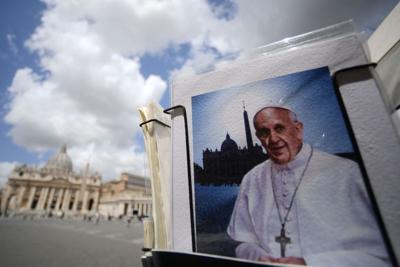News-Miner opinion: The news of Pope Francis’s passing reverberates far beyond the cobblestone streets of Vatican City. Even here, in Interior Alaska, we pause to reflect on the legacy of a man who made it his mission to elevate the overlooked and listen to the unheard.
Pope Francis was the first pontiff from the Americas, the first Jesuit pope, and the first in centuries to take his name from St. Francis of Assisi — a clear signal that he would lead not with grandeur, but with humility. He died unexpectedly Monday at age 88.
Fairbanks might seem a world away from Rome, but for the more than 11,500 Catholics in the Diocese of Fairbanks — an area stretching over 400,000 square miles and encompassing dozens of remote Native villages — Francis was a familiar and comforting presence. He spoke often of the “peripheries,” those places geographically or spiritually distant from the centers of power. Few places fit that description better than the Yukon River Delta or the icy shores of Kaktovik. But Francis never saw remoteness as irrelevance. He believed the church must go to the edges — not to extract, but to serve.
His papacy wasn’t perfect. His efforts to confront the church’s historical failures, including clerical abuse and the pain inflicted on Indigenous communities, were met with both praise and criticism. Yet he tried. In 2022, he traveled to Canada to apologize for the church’s role in residential schools. While he never made it to Alaska, his gesture rippled northward, touching communities here that share that painful legacy. He did not offer easy answers, but he did offer something many had never received: an acknowledgment.
Francis also reminded us — repeatedly and unflinchingly — that stewardship of the Earth is a moral duty. His encyclical “Laudato Si’” reads almost like a love letter to the boreal forests, rivers and permafrost we call home. He challenged world leaders and ordinary people alike to see climate change not just as science or politics, but as a profound spiritual crisis. In an era when Arctic communities like Shishmaref and Newtok are slipping into the sea, his words carried weight here.
He was not a pope of rigid doctrine but of radical empathy. He washed the feet of prisoners, embraced the sick and reminded the powerful that the poor are not expendable. In a place like Fairbanks, where economic gaps widen, and where village residents may struggle to access health care, education or housing, that message feels as urgent as ever.
Pope Francis’s passing marks the end of an era. But his legacy — of mercy, of inclusion, of moral courage — endures, even here at the edge of the Arctic. He saw value in every corner of the world. He would have seen it in ours, too.












